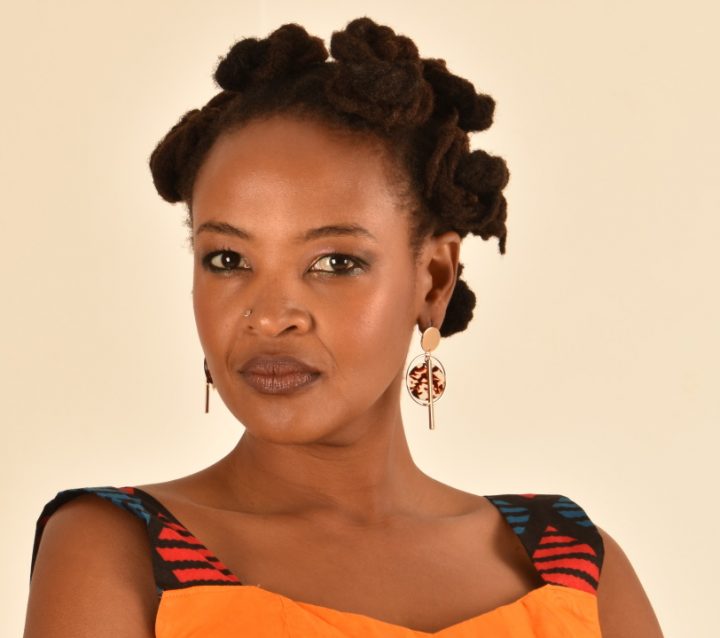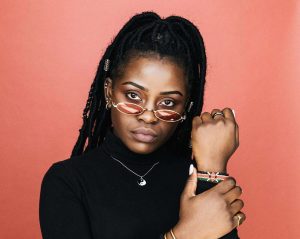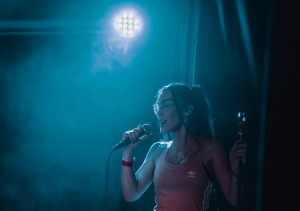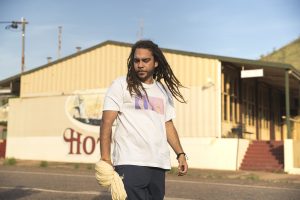Please tell us your story! How did you get to where you are today?
Greetings- I would like to start by paying my respect to the original people of the land from which you read this, I’m currently located on the lands of the Gadigal people.
I came here from Uganda with my family many years ago and this is the place that introduced me to Hip Hop music and it’s where I found my passion and love for storytelling through lyricism, culture, community and social change. I got to where I am today by following my heart and interrogating social injustices and through hip hop culture where I found curiosity about the world, African history and expression of art to respond to the time. I have met many people on my journey who have mentored me and directed me to develop and present my works & words. I am a Hip Hop Artistivist, Senior Program Manager, Chair/President at Addi Road Community Centre & media maker.
I love the power of art, it has given the equivalent of a university degree.
Why did you want to get into the music industry?
When I started making music I didn’t think I could be a part of the music industry. I just wanted to perform, play and make music all day. I wanted to make space for more people like myself to have representation; and to learn how the music we love is distributed and shared around the globe.
“Cultural appropriation is something I have been thinking about. Appropriation of who gets to represent the global black experience.”
Do you feel that higher education is a necessary step to enter the music industry?
I don’t feel that higher education is the only way in, but I do feel that having knowledge of whatever field you want to be a part of is vital. Everyone has their own way, some don’t have the same resources or networks as others and that creates a disadvantage.
Let’s talk about the highs vs the lows of your career. What is your greatest achievement? And are there any moments you would like to share that you learnt greatly from?
My greatest achievement is to become versatile and still be able to be called to present my work. I’ve had many moments of learning and understanding of why things may not go the way you want them to. One of my biggest ones is to always remember the why, why you wanted this in the first place, to analyse if that is where I’m still at and if there is room for evolving.The struggle is real and their are some harsh lessons that I have learned about who can participate to their fullest potential who can not.
Who has been your biggest champion in your career?
That’s a hard question. I have seen many champions, but the ones who are always pushing me to keep going are the people in the audience; responding or reacting and feeling. It’s the ones who came before me who’ve paved the way & it’s my ancestors. There is not one single person, there are many who had come & gone on the journey. I have found prolific sisters Lizzie Jarret & Nancy Denis together, champion each other are always challenging the norms & we are Black women who have common experience and we support each other.
What is the best piece of life advice you’ve ever received?
Professional distance. When I received advice and when I started to apply it I saw a difference in how I approach the work/life balance.
What would you tell your younger self if you could tell them anything?
I would tell her it’s not as simple as it looks, there are some things that will never change and there are some things you can change.
What is your big picture career goal?
I’m curious to know why career and goal is such a theme. Success is self defined. I work away from the status quo and I don’t approach career in the traditional way. Decolonising is my approach to everything I do and in all areas of my activities where I can. I have a strong work ethic and believe in the power of energy and how & where I spend my time. My bigger picture goal is to be in a leadership position, working to nurture our sector for better access and removing some of the unnecessary red tape.
Who are your role models in the industry be they local or International?
My role models is Emprezz Golding who relocated to Jamaica where she comes from, we met in my younger years. She was a mentor and a role model for me as one of the successful Afro women in music. Moving alongside her really shaped me taught me a lot about the industry and how to get into places and spaces. The wonderful women at BMAA Gill and Danielle, Vicki Gorden of AWMA, Candy Bowers, Saba Vasefi, Hot Brown Honey to name a few.
Who are your top 3 ‘artists to watch’?
Do you think the Australian Music Industry is where it needs to be in regarding diversity? If yes or no, what would you like to see?
Wow, I don’t want to be responsible for responding to this issue as I’ve said what I said and I observe The illusion of inclusion… Diversity has been captured and it’s not hard to make space so why do we need to have policy and panels to discuss it if the results of these ideas are not put into action.
What does true allyship look like to you?
True allyship is giving up your space, seat and giving it to those who need it most. True allyship is showing up and not expecting a pat on the back or an award for being inclusive. True allyship is care and consideration. It’s willing to listen, to be humble and honest.
Music & activism have always gone hand in hand, when together it is powerful & influential. Why do you think that is so?
Music has been a powerful storytelling tool to narrate the struggle and publish oral history of oppression & celebration. It tells the positives and delivers happiness; I truly love that it can be a form of healing and therapy. It’s so powerful that even musicians have joined the resistance to promote unity and it’s been the perfect accompaniment to political movements and campaigns. We see the power of Hip Hop used as a tool to report the genocide and displacements of Palestinians. Music is timeless.
What is performance activism?
The illusion of inclusion. Using buzzwords or acronyms, but not having the lived experience to be the facilitator of the activism.
How can allies in the music industry best support BI&POC artists and avoid performative activism?
Allies can better support by making better decisions when it comes to representation, working with people who have lived experience and giving autonomy. It’s being conscious about cultural appropriation and protocol. We really have a long way to go.
What does a BI&POC safe space look like to you?
All BIPOC everything from the door, the floor, front the front, the back, from beat to the street. A safe space is not hard to create without needing a checklist to see if you have everything.
“For me it starts with identifying what your purpose is and surrounding yourself with likeminded people to bounce off & have a commonality. I have definitely experienced this but it’s seeing others who have been bold and brave to stand in their truth that has given me confidence.”
Are there systemic issues within the Australian Music Industry that need to be dismantled and rebuilt?
I feel that this topic has been on the table for a while and it’s not being addressed.The systematic issues stem from colonisation.
How does Australia compare to international markets when it comes to BI&POC representation in mainstream media?
Australia can learn from International markets. There is still a lack of mainstream representation. I can’t say that I’m an expert of international markets, but there is room for popular genres like hip hop, soul, reggae to have more placement in festivals and inclusion when it comes to ceremonies and showcases.
How does your culture play into your creativity as an artist?
Culture plays a significant role in my creativity. I have spent the last 2-3 years playing in a Afrombollo band lead by Seneglense master dancer & drummer Yacou Mbaye and together we fuse hip hip into african music , djembe and traditional instruments like xylophone and talking drum. I’m very much a pan-africanist and I believe in one Africa so to sing songs in wolof and share my songs to the rhythms of African beat it’s truly a dream come true.
Tokenism, Colourism, Discrimination & Representation are extremely important issues that are lightly discussed in the music industry, particularly in panels.
As a BI&POC artist, have you seen positives that have come from those discussions?
Yes I have seen BIPOC artist in the mainstream more now than previously and that is a direct action from those discussions.
Do they delve deep enough?
Depends who is hosting them. I think we have to mindful of who we share our experiences with and it’s safer to do that in a room of people who can relate to your story or experience.
Is there anything missing from the conversation or do you have something you would like to be discussed in these panels?
Cultural appropriation is something I have been thinking about. Appropriation of who gets to represent the global black experience.
As an artist what is important for you as an artist to see at your shows when it comes to audience engagement, what message would you love for them to take away?
Audiences are the best. That’s one thing that is working, I see the best and most supportive and loving audiences. That’s how we know audiences want the authenticity, the real thing that makes them feel things.
What advice do you have for BI&POC folk who are coming up in the industry, particularly in your line of work?
Be yourself, tell your own story and there is no benefit in imitating an experience that is not yours, there is no longevity in it. Speak from your core and be inspired by others. Stay hungry even when you’re full and leave some room for more!
What was it like growing up & experiencing the industry outside looking in? Now that you’re in it, what has your experience been like?
What doesn’t kill only makes you stronger. Growing up hungry is different and once you have gained some experience then your approach is different. Being in the industry you see its work. My experience has been gratifying and life changing. When I was 14 I said I wanted to do this and I am doing it.
Most people don’t see the mountain of work that goes into your art till you’re towards the peak, what was the hardest obstacle you’ve had to overcome as an artist?
The pain of late nights, early mornings and working in between studios & shows. The choice to be independent has been challenging and the juggle that comes with that.
Self identity & imposter syndrome are issues women in the industry struggle with. Have you faced this issue? If so/not, what tips can you give to encourage others to stand in their truth?
True that! For me it starts with identifying what your purpose is and surrounding yourself with likeminded people to bounce off of & have a commonality . I have definitely experienced this, but it’s seeing others who have been bold and brave to stand in their truth that has given me confidence. It’s not for everyone to be the change makers and there are special individuals who have been gifted with the task to make spaces better for everyone & it’s okay if your message is different to mine.
As an artist, is there a message you would like to give to others in the industry that don’t work in your line of work? Eg. Bookers, label leaders, producers etc.
Take the risk and trust in the spirit of art and music. It’s not only about likes, the followers and the numbers, chose quality.
“Music has been a powerful storytelling tool to narrate the struggle and publish oral history of oppression & celebration. It tells the positives and delivers happiness and I truly love that it can be a form of healing and therapy. It’s so powerful that even musicians have joined the resistance to promote unity and it’s been the perfect accompaniment to political movements and campaigns.”
Any exciting projects in the works? What can we expect to see in 2024 from you?
Yes exciting projects in the works, ‘World On Fire’ International Women’s day at Lazybones with my sis & veteran vocalist and all round lyrical genius Merenia Marin we are performing some unreleased work that is ready to be shared and the title is fitting the current global catastrophe! Dancey Dance Time will be evolving this yeat look out and some other works to be announced currently embargo but exciting 🙂
What is your go-to Karaoke song?
James Brown- I’m Black & I’m Proud!



